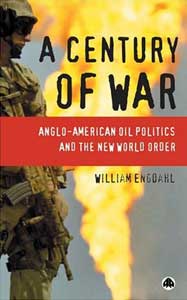23 March 2005 Edition
Oil and imperialism

Book Review
A Century of War
Anglo-American Oil Politics and the New World Order
By William Engdahl
Pluto Press (October, 2004) Price £15.99
THE last century was a bloody one of wars and destruction. It is out on its own compared with any other century in terms of the frightening scale of manmade horror and mayhem.
William Engdahl argues convincingly that the primary cause of much of the violence and destruction is Anglo-American capitalism and its need to control the fuel for all human industry - petroleum.
The control of the world's oil is in the hands of just seven companies, including British Petroleum, Shell, Esso and Texaco, all owned by British and American financial groups, which in turn dominate the government policies of these two countries and their financial markets and institutions.
Dismiss this as simplistic conspiratorial thinking at your peril. Because the oil-finance complex at the heart of the British and US Governments is the thread which explains so many seemingly disparate events and phenomena, from the illegal Anglo-American aggression and occupation of Iraq, to the US plan to attack Afghanistan more than a year before 9/11, to the British and American continual propping up of unjustifiably overvalued national currencies (which is killing manufacturing jobs in those countries), to the illegal bombing of Yugoslavia, to the threatening stance towards Iran over alleged development of nuclear weapons, and so much else.
But let's go back to the two commanding heights of human death and suffering of the 20th Century, the First and Second World Wars, which respectively saw 20 and 55 million deaths.
William Engdahl connects the motive force behind these catastrophes to the imperialist greed of Britain and the US, as dictated by the oil-finance complex.
In the case of the First World War, it was primarily Britain's envy of a much more robust and egalitarian German model of industrial and social development that prompted London to smash its enemy through war. Of most concern to London was an ambitious railway being constructed from Berlin to Baghdad for oil transport.
Outperformed in every sector, from technological development to industrial production, from overseas trade to domestic social welfare, the British contrived to create the circumstances of a Europe-wide war to sabotage a rival power. No matter that millions of ordinary working men and women would pay a horrific price.
The sabotage of Germany and punitive reparations imposed by Britain and its allies led directly to the immiseration and desperation which in turn sowed the seeds of Nazism and Hitler's rise to power.
But the connection was more than indirect. Key figures from the British and American oil-finance complex were instrumental in backing the rise of the Nazis. Elites from the oil companies and financial institutions, like the Bank of England's Montagu Norman, were crucial in channelling massive investment from Britain and the US to stabilise the Nazi regime and bolster its awesome military-industrial growth.
As with so many other despotic regimes in Africa, Asia and the Americas over the past century, self-serving British and US elite power interests created a Frankenstein monster in the form of Hitler, for which again ordinary people paid a horrific price. Saddam Hussein is another from the same genre.
The great thing about this book is that Engdahl cuts through the smoke and smear, he rips off the pinstripe suits of disguise and unscrambles the plummy accents of civility to expose the real monsters in world history.


